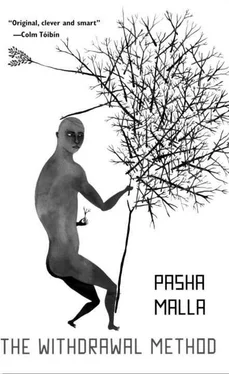What are you wearing, Mum. He wants to know. Go on, tell him.
What am I wearing? the boy's mother repeated, her gaze tracing down over her power suit, noticing for the first time the run in her nylons, then down to the man splayed across the pavement, one leg at a funny angle, and bleeding.
Timber whispered it again, What are you wearing?
Almost before it was out, the woman was backing away and hissed, Get in the car, at her son, and she gave him a shove and there was a quick tapping of footsteps and doors slamming and Timber waited for the revving of an engine and a car speeding away. But it never came. He looked up and there in the front seat sat Rick on his cellphone and his mom had her head in her hands. Was she weeping? Why?
Timber's body felt strange and cold, and here was the pain, coming in surges from his toes to the tips of his fingers. Everything throbbed in time with his pulse. He closed his eyes and here appeared Lance Armstrong. And here also was Neil, standing between his hero and his father, a great wheel around them. The boy gazed back and forth between the two men.
Timber wanted to say, Come this way, son, but when he opened his mouth to speak nothing came out; he felt like a fish wordlessly blubbing away as it bobbed about its tank. Lance Armstrong stood beaming. Neil looked confused. But then Timber realized that it wasn't a wheel at all, but a web, and Lance Armstrong held the opposite end of the same flimsy strand of silken line as Timber, and Neil balanced precariously in the middle, tightrope-style, and they were working together to keep the boy from falling.
And it wasn't just Lance Armstrong either — all around the web people materialized, holding on, keeping Neil up: The Ex-Wife held a piece, eyes fierce; dressed in his scrubs, there was Dr. Sloan, clutching on as though for dear life; Mr. Barry Parker was lending a hand, steadying his thread in two hands, looking resolute and focused. Grace and Sari were there too, fully clothed. Even Ted Givens stood nearby, doing his best despite himself.
From somewhere in the real world came a sound of birds cawing, twittering, and the swoosh of flapping wings, and suddenly beneath the web in Timber's mind's eye sprung up a thick, dark forest of towering trees, and in the branches of these trees were magpies, stretching their wings, roosting.
Lance Armstrong looked frightened! Lance Armstrong didn't know what to do; he looked as though he might drop his side of the web and send Neil plummeting into the woods and the waiting magpies. This was Timber's moment, and Timber had helmets, ice-cream tubs, with holes cut for eyes. He held out a tub to Neil, while the magpies began to emerge from the woods, rising like a handful of soot flung up from the treetops below.
In the real world Timber thought he heard a siren, the faraway scream of it, maybe coming closer. But he willed the real world away, and Janet was with them now, Janet with a tub of pralines 'n' cream on her head beside him. Neil was moving across the web, reaching for his own tub decorated with stickers of all sorts, gleaming, and Janet's body was warm and soft, a breast against Timber's arm, and Lance Armstrong and everyone else were fading, fading, while the magpies circled up squawking all around them.
Everyone was gone then. There they were: Timber, Janet, and Neil. They huddled together in their helmets. Through the eyeholes everything looked black. The magpies were wing to wing, moving in. No light shone through. Timber held Janet close and Janet held Neil close and with their bodies clinging to one another Timber felt deep within all that suffocating fear a little flicker of something. Maybe they would be all right. Timber wrapped his arms around Janet and Neil, drawing them in, their helmets knocking together.
Looking out, it seemed as though the magpies ceased to close in. Everywhere was still black, but Timber felt more like he was standing in a room suddenly plunged into darkness, with the walls of the room at once disappearing and seemingly speeding outwards, and with it the room, yes, the room became as endless and infinite and terrifying and wonderful as the universe.
ON SATURDAY evenings the writer named Womack takes a break from his novel and looks after the boy. He goes to the boy's house in the suburbs, far from where Womack lives among the other writers and artists in the city. It is winter and he rides out to the suburbs on his bicycle, wheels up slickly in the slush on the street and chains his bicycle to the fence that pens in the yard, then comes into the house, shivering and wet.
The boy is twelve, and dying of a degenerative illness. He can no longer see, hear, walk, or speak, although there are times when he laughs. This laugh is a cackle, a shriek. If Womack were to describe the laugh in his novel it would become a sudden bolt of blue lightning over an empty, black sea. Womack is a writer of prose, but fancies himself something of a poet also. Womack has studied writing in university and wants his novel to be something new, something fresh and free of cliche; these days he hears cliches even in speech and cringes.
Saturdays are the same, almost without variation: Womack arrives and the boy's mother, Sylvia, is waiting in the den, standing over her son in his wheelchair. She offers thanks and passes the boy off to Womack and disappears into her bedroom, and Womack then hoists the boy out of his wheelchair and props him up against his body and carries him around the house, and the boy moans. The boy moans and moves his legs as if he were walking, but he is not; the boy's legs hang limply from his body, dragging on the floor. Like this Womack manoeuvres the boy, slowly, step, step, step, from room to room around the house.
THE WRITER Womack used to live with a woman named Adriane whom he had that autumn begun to introduce to people as his partner, as though they were business associates or cops. The word arrived into his vocabulary at a party that was both Halloween party and stag-and-doe party for friends of Womack's, friends named Mike and Cheryl who would be married a week before Christmas. In the hallway, Womack's arm draped over Adriane's shoulder, a woman dressed as Fidel Castro introduced another woman, also dressed as Fidel Castro, as her partner, and Womack repeated the word in reference to Adriane. At this, like a child escaping the embrace of a foul-breathed and bearded aunt, Adriane slid out from underneath his arm, nodded at the Castros, and sipped her drink. Later, she confronted him in the kitchen.
Partner? she asked. The kimono of her geisha outfit shimmered and swished.
Sure, Womack told her. His costume was Hockey Player: helmet, gloves, stick. That's what people say now, he said.
Straight people?
Sure.
For the rest of the evening, Adriane adopted a Texan accent when addressing Womack — Yee-haw! Fetch me another drink, pardner! Even so, the new label made Womack feel modern and serious. Gone was the term girlfriend, used for those who had filled that role since his early teens. Now he had a partner. This was heavy stuff.
At midnight Womack and Adriane came home to the place that they had moved into together that July, their place that was not quite loft and not quite studio, their place where a wall divided two long, high-ceilinged rooms in defiance of architectural categorization. You entered the apartment to a kitchen and dining space; through an arched doorway was a living area with a couch and a stereo and the desk with the computer where Womack wrote his novel. At the back of the room, behind drawn curtains, sat their bed. This area they called the bedroom, even though it was not technically a room at all.
Adriane, who worked the next day, went straight to bed. Womack ditched the helmet, gloves, and stick in a closet, sat down at his desk in his uncomfortable chair, turned on his computer, and began typing. The uncomfortable chair had wheels and the floor was warped, slightly. At one point, when Womack's typing relented and he let go of the keyboard, the desk released him gliding into the room until he stopped with a bump against the window on the far wall.
Читать дальше












